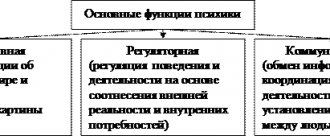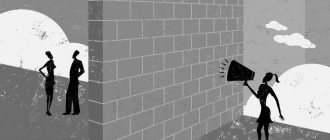Mental functions are certain properties and qualities of the psyche that ensure adaptation to changing environmental conditions. This is an integral system in which full interaction between the world and man is possible due to the interconnection and interdependence of all functions.
This definition of functions stems from an understanding of what the psyche serves and what it provides for human life. Thanks to the psyche, a person creates his own picture of reality based on the reflection of the surrounding world and can coordinate his activities and behavior.
The forms of such reflection can be different, and they are, of course, not unique to humans. What distinguishes a person from a dog or cat are the mechanisms of action of the psyche, which arose under the influence of the sociocultural development of society. The functions of the psyche underlie such complex and multi-valued mental processes and phenomena as memory, speech, imagination, thinking, perception, which themselves form consciousness. At the same time, there is also a lower level of the psyche, the level of the unconscious, which appears as a result of unconscious influences.
The world of the psyche is the inner spiritual world of a person. Subjective reality in which thoughts and feelings, emotions, interests, dreams and plans for the future, relationships with people and with oneself exist. Everything that makes a person different from anyone else, unique. The psyche is mobile and changeable, never stands still, and always develops due to the life experience gained.
The study of the psyche is not complete even today, and therefore there is no unified understanding of all functions. At the end of the 19th century, it was generally accepted that the psyche has only one function - adaptation, which allowed a person to survive in unfavorable environmental conditions. Of course, this explanation was not enough to justify such complex phenomena as creativity or love. Today in psychological literature, three functions of the psyche are identified and described, which are recognized as the most important. This is, first of all, a reflection of the surrounding reality. Then regulation of behavior. And in a general sense - awareness of one’s place in the world.
1. Reflection of the surrounding reality
The main ability of the psyche, manifested in the direct reflection of the environment. This is an active free process of constant and continuous cognition of reality, which is subjective in nature. This means that reflection depends on the individual personality characteristics of a person and even on a specific psycho-emotional state.
That is why people often fundamentally disagree in their opinions regarding similar objects or phenomena. Reflection allows you to build your own unique picture of the world, and each person has his own. At the same time, however, the subjectivity of perception does not deny the objectivity of the reality of the surrounding world, being, rather, a cast of reality.
Another feature of reflection was the ability to predict the course of events, as well as the result of one’s actions based on knowledge of the laws of the world and life experience.
2. Regulation of behavior
This feature allows you to react and respond to stimuli. Human behavior, moreover, is an external manifestation of the inner world. It depends on what motives and needs guide a person, in what ways he achieves his goals, what decisions and plans he makes for the future. Emotions in this case are a feedback channel showing how satisfied a person is with what surrounds him and what he does.
The main characteristic of this function is its arbitrariness. A person controls his behavior through volitional effort. This is very important because people live in society and are social beings. It would be impossible to build relationships with people without the ability to regulate one’s behavior through volitional effort.
3. Awareness of yourself and your place in the world
A person recognizes himself as an individual, with all the originality of character traits and individual characteristics of behavior. Understanding his difference from others, each person considers himself a part of society, thanks to which it is possible to build interpersonal relationships.
This function of the psyche largely makes it possible to ensure a person’s adaptation to the surrounding reality and the ability to navigate it. An important indicator, in this case, is adequacy in relation to oneself and to the world. An uncritical attitude distorts the picture of the world and interferes with building relationships.
Human behavior, as a social being, is particularly complex. And the processes of reflection and regulation depend on the active orientation. Therefore, active and reactive regulation and reflection are distinguished. A person, due to the presence of consciousness, is able not only to react passively to changes in environmental conditions, but to build his own conscious behavior.
There are other classifications that more fully or more briefly describe the functions of the psyche and their purpose. Here is an example of a detailed classification of mental functions.
Implicit functions and explicit functions of the psyche
Implicit functions (affective, gnostic, regulatory). These functions coordinate human interaction with the outside world. The basis of implicit functions is the nervous system and the brain, which are organs of mental activity. That is why these functions are considered to be specified from within.
Explicit functions (communicative, cognitive, emotive, conative, informational). They organize and manage a person’s interaction with other people, with himself and with the world of things. Their basis is the psyche and sense organs, and therefore they are considered given from the outside.
The main functions of the human psyche and forms of its manifestation
Thus, the psyche arose at a certain stage in the development of living nature in connection with the formation in living beings of the ability to actively move in space. In the process of evolution, the psyche developed according to biological laws from the simplest to complex forms that are characteristic, for example, of monkeys. It should be noted that the human psyche is at a higher level of development than the psyche of animals. At the same time, the psyche is a form of active reflection by the subject of objective reality, which arises in the process of interaction of highly organized living beings with the outside world and carries out a regulatory function in their behavior (activity).
Rice. 7. Scheme of the emergence of psychic reflection
Mental reflection is not a mirror, mechanically passive copying of the world (like a mirror or a camera), it is associated with a search, a choice; in mental reflection, incoming information is subject to specific processing, that is, mental reflection is an active reflection of the world in connection with some necessity, with needs, it is a subjective selective reflection of the objective world, since it always belongs to the subject, does not exist outside the subject, depends on subjective features. The psyche is a “subjective image of the objective world”, it is a set of subjective experiences and elements of the subject’s internal experience.
In today's psychophysiology, the problem of the substrate of the psyche is also intensively discussed. The problem can be posed as follows: is the psyche simply a property of the nervous system, a specific reflection of its work, or does the psyche also have its own specific substrate? The only thing that can be said here for now is that the psyche cannot be reduced simply to the nervous system. Indeed, the nervous system is an organ (at least one of the organs) of the psyche. When the activity of the nervous system is disrupted, the human psyche suffers and is disrupted.
But just as a machine cannot be understood through the study of its parts and organs, so the psyche cannot be understood through the study of the nervous system alone. Perhaps the psyche also has its own substrate? Although the brain is an organ whose activity determines the psyche, the content of this psyche is not produced by the brain itself, its source is the external world.
The characteristics of mental processes are not derived only from the patterns of functioning of the brain that implements these processes. Mental phenomena are correlated not with a separate neurophysiological process, not with individual areas of the brain, but with organized sets of such processes. That is, the psyche is a systemic property of highly organized matter, which consists in the subject’s active reflection of the objective world, in the subject’s construction of a picture of this world that is inalienable from him and self-regulation on this basis of his behavior and activities.
Here we must pay attention to another important feature of the human psyche - the human psyche is not given in a ready-made form to a person from the moment of birth and does not develop on its own, the human soul does not appear on its own if the child is isolated from people. Only in the process of communication and interaction of a child with other people does he develop a human psyche, otherwise, in the absence of communication with people, nothing human appears in the child either in behavior or in the psyche (the Mowgli phenomenon). Thus, specifically human qualities (consciousness, speech, work, etc.), the human psyche are formed in a person only during his lifetime in the process of assimilating the culture created by previous generations. The psyche performs a number of different functions
(Fig. 8).
Rice. 8. Basic functions of the human psyche (according to B.F. Lomov)
1. Cognitive (cognitive) function.
The psyche is a property of the brain, its specific function. This function is in the nature of reflection. The mental reflection of reality has its own characteristics. Firstly, this is not a dead, mirror reflection, but a process that is constantly developing and improving, creating and overcoming its contradictions. Secondly, with the mental reflection of objective reality, any external influence is always refracted through previously established characteristics of the psyche, through specific human states. Therefore, the same impact can be reflected differently by different people and even by the same person at different times and under different conditions. Thirdly, mental reflection is a correct, true reflection of reality. Emerging images of the material world are snapshots, copies of existing objects, phenomena, and events.
2. Regulatory function. The human psyche and consciousness, on the one hand, reflect the influence of the external environment, adapt to it, and on the other hand, regulate this process, making up the internal content of activity and behavior. The latter cannot but be mediated by the psyche, since it is with its help that a person realizes his motives and needs, sets goals and objectives for his activity, and develops ways and techniques to achieve its results. Behavior in this case acts as an external form of manifestation of activity.
3. Communication function. The psyche ensures the process of exchanging information between a person and the outside world using signals and sign systems (speech). With the help of communication, a person is able to unite efforts with others like himself and direct them to achieve a goal. The need to organize joint activities was one of the prerequisites for the emergence of consciousness and pushed primitive man to the invention of speech communication. In the process of communication, a person shows his relationships to objects in the surrounding world and to other people; in the process of communication, relationships between people are established.
The totality of phenomena and processes studied by psychology, reflecting the basic content of the human psyche, represents the world of mental phenomena. The psyche is complex and diverse in its manifestations. Usually, three large groups of mental phenomena are distinguished, namely: 1) mental processes, 2) mental states, 3) mental properties (Fig. 9).
Mental processes. Mental processes are a dynamic reflection of reality in various forms of mental phenomena. A mental process is the course of a mental phenomenon that has a beginning, development and end, manifested in the form of a reaction. It must be borne in mind that the end of a mental process is closely related to the beginning of a new process. Hence the continuity of mental activity in a person’s waking state.
Rice. 9. Forms of manifestation of the human psyche
All mental processes are divided into cognitive - these include sensations, perception, memory, thinking and imagination, emotional - emotions and feelings, regulatory - attention and will.
Mental processes occur with varying speed and intensity depending on the characteristics of external influences and personality states. They ensure the formation of knowledge and the primary regulation of human behavior and activity.
V.P. Zinchenko defines attention as the process and state of the subject’s attunement to the perception of assigned tasks. Often in classifications of mental phenomena, attention is conventionally classified as cognitive processes, since attention itself does not carry any information, but “serves” all cognitive processes and makes them effective. Attention may also be associated with volitional processes (voluntary attention), or perhaps not associated with them (involuntary attention). Therefore, assigning attention to any category of mental phenomena poses a certain difficulty.
Mental states. A mental state should be understood as a psychological category, which includes different types of integrated reflection of the impact on the subject of both internal and external stimuli without a clear awareness of their substantive content. Or in other words, this is a certain level of performance and quality of functioning of the human psyche, characteristic of him at a given moment in time. Every person experiences different mental states every day. In one mental state, mental or physical work is easy and productive, in another it is difficult and ineffective.
Mental states are of a reflex nature: they arise under the influence of the situation, physiological factors, progress of work, time and verbal influences (praise, blame, etc.).
Mental properties are the highest and most stable regulators of a person’s mental activity. Mental properties of a person should be understood as stable formations that provide a certain qualitative and quantitative level of activity and behavior typical for a given person. Each mental property is formed gradually in the process of reflection and is consolidated in practice. It is therefore the result of reflective and practical activity.
Gnostic functions
They ensure the receipt and assimilation of information about the properties of objects in the process of interaction between a person and the outside world.
Information received from the outside is processed in internal processes - memory, perception, imagination, sensations, representation and thinking. A person gets the opportunity to form his idea of the world, plan his actions and foresee the outcome of his actions.
Gnostic functions underlie cognitive activity. The result of their work is knowledge and intellectual potential.
A few words about the main thing
Psychology defines the psyche as something that performs certain functions, for example, reflects the influence of the surrounding world, regulates the behavior of an individual and the activities of different people, helps to understand one’s place in the surrounding world, and the like.
The human psyche is a wide spectrum and consists of 4 global components:
- Reflection.
- Self-awareness.
- Regulation of behavior.
- Communication.
In fact, the functions of the psyche are complex mechanisms that, having a number of features, must be considered separately.
Cognitive functions
Provide meaningfulness to human cognitive activity.
A person’s personal orientation sets a certain focus on imagination and thinking. And therefore it is the starting point in the development of intelligence.
Under the influence of interaction with the world, processes such as thinking, representation, and imagination are formed. In this way, an internal model of the world is created and a person can foresee the results of actions. Thanks to this, for example, it is possible to find mutual understanding in communicating with people.
Cognitive
This function lays the foundation for others, it is present in the psyche of all living beings living on the planet.
Passing through the nervous system, it affects brain activity, reflecting a mirror copy of the external image, adjusted for the unique atypical personal characteristics of the individual.
Cognitive function has a number of specific features:
- She is dynamic.
The psyche never stops in its development; it changes under the influence of the reflected reality that surrounds a person.
- Has several images.
The psyche is subject to changes under the influence of the psychological qualities of an individual person, his emotional and physical well-being at the current moment in time, and the development of the situation as a whole. If you study the same influence on different people, it will be noticeably different, since the assessment will be transmitted through your already formed psyche.
— Reality is reflected from the mental side.
All human life is filled with pictures. These are photographs and copies of ongoing events, those manifestations of objects that we see around us.
The reflected external world is associated with the basic senses: olfactory, tactile, gustatory, visual, auditory. They help a person put together a puzzle of a complete picture of the world, feel it from all sides.
Group phenomena
The concept of “psyche” is quite broad, so it is not easy to explain it in one sentence or example. The structure of the psyche is supposed to be divided into four main groups: properties, processes, qualities and states.
1. Properties. Mental properties are personal qualities and characteristics that belong to a particular person. They can be repeated in other individuals or be exclusively individual.
In addition, these characteristics can be passed on to other generations. These traits include the properties of the nervous system (strength, mobility, calmness, etc.).
We recommend: Psychic reflection is
2. Processes. These are qualities that received their definition in the process of life. They are based on some knowledge, observations and feelings. Two types of processes can be distinguished:
- Cognitive (memory, thinking, imagination, sensations, etc.).
- Emotional-motivational (emotions, motivation, feelings, etc.).
3. Qualities. These traits appear due to the environment, as well as the genes of the parents (character, intelligence, emotionality, etc.).
4. Condition. Reflects the degree of human performance. Conditions depend on physiological characteristics and external influences (mood, inspiration, etc.).
Scientific interpretation
The concept of scientists on the issue of the emergence of the psyche is as follows:
- According to scientists, the psyche appeared at a certain stage in the development of living organisms. It is a reflection of their manners, habits and actions. As living beings progressed, the psyche also developed. In its evolution, it went through two stages: instinctive and personal training.
- Psyche and consciousness are the culminating phase of evolution. This achievement arose thanks to active work, which took place in a society that was quite civilized for that time.
- The psyche in action has the strongest development. It is movement and activity that creates change. An important pattern is the transition of activity and any actions into a mental image, and vice versa.
- The human psyche is shaped by the functioning of the brain, but in fact it is an individual phenomenon that depends on social actions.
- Mental phenomena have a specific system and structural organization.







